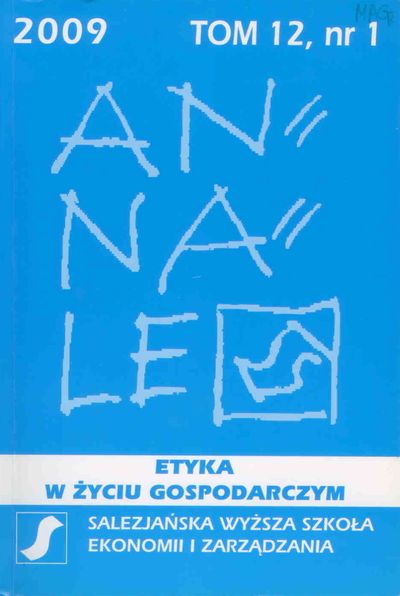Sakralizacja konsumpcji jako fenomen globalizacji
DOI:
https://doi.org/10.18778/1899-2226.12.1.10Słowa kluczowe:
consumption, consumer, sacralization, temples of consumption, globalizationAbstrakt
The act of consuming in our new, global reality doesn’t have a lot in common with taking part in the classic ‘purchase and buy’ exchange relationship. The satisfaction of basic needs is no longer the main target of consumption. The contemporary consumer experiences a constant “hunger” and continual need for new objects and impressions, which is almost impossible to alleviate. It can cause frustration deepened by the feeling of spiritual emptiness. The article or the service itself becomes a fetish, indicating a change in relations between the object and subject. This is related to the revelation of a new dimension of consumption, which itself starts taking on the features of the sacrum. The act of shopping takes on a similarity to certain more sacral rituals. The „puzzle” of sales, special offers and special occasions such as holidays, Christmas, Valentine's Day, Mother’s Day etc, are the remains of the liturgical year. The impression of “sacralized consumption” is experienced in even greater depth when you step inside what has become known as the “new temples of consumption”, which take on the physical shape of the perfect space, full of harmony, where everything is fully controlled and totally safe, out of the context of time and place. The model of contemporary consumption gives a promise of immediate happiness and salvation, distracting the consumer from reality and giving him an ersatz of the medicine needed to treat his existential fears. Most members of Western society now accept this situation by taking part in it. The question is when they will start to reject those individuals who refuse this lifestyle and accuse them of acting against moral standards and the common good?Bibliografia
Baudrillard J., Społeczeństwo Konsumpcyjne. Jego mity i struktury, Wydawnictwo Sic!, Warszawa 2006.
Google Scholar
Bauman Z., Globalizacja, PIW, Warszawa 2000.
Google Scholar
Bauman Z., Społeczeństwo w stanie oblężenia, Wydawnictwo Sic!, Warszawa 2006.
Google Scholar
Bogunia-Borkowska M., M. Śleboda, Globalizacja i konsumpcja. Dwa dylematy współczesności, Wydawnictwo Universitas, Kraków 2003.
Google Scholar
Bush G., Wystąpienie 20.12.2006, TV CNN
Google Scholar
DOI: https://doi.org/10.7748/ns.20.27.12.s20
Dąbrówka A. [w:] Materiały z konferencji zorganizowanej przez Komisję Kultury i Środków Przekazu, pod patronatem Marszałka RP B. Borusewicza 25.04.2006 r., Kancelaria Senatu, Warszawa 2006.
Google Scholar
Eliade M., Sacrum i profanum. O istocie religijności, Wydawnictwo KR, Warszawa 1999.
Google Scholar
Fiske J., Reading the Popular [za:] G. Makowski, Świątynia konsumpcji. Geneza i społeczne znaczenie centrum handlowego, Wydawnictwo TRIO, Warszawa 2003.
Google Scholar
Kołakowski L., Obecność mitu, Wydawnictwo Dolnośląskie, Wrocław 1994.
Google Scholar
Kubański G., Nadprzyrodzone [w:] Nadprzyrodzone, red. E. Przybył, NOMOS, Kraków 2003.
Google Scholar
Makowski G., Świątynia konsumpcji. Geneza i społeczne znaczenie centrum handlowego, Wydawnictwo TRIO, Warszawa 2003.
Google Scholar
Motak, Racjonalizacja nadprzyrodzonego, czyli o ofierze z intelektu [w:] Nadprzyrodzone, red. E. Przybył, NOMOS, Kraków 2003.
Google Scholar
Patrzałek W., Wstęp [w:] Kulturowe determinanty zachowań konsumenckich, red. W. Patrzałek, Wydawnictwo Uniwersytetu Wrocławskiego, Wrocław 2004.
Google Scholar
Ritzer G., Magiczny świat konsumpcji, Wydawnictwo Literackie MUZA S.A., Warszawa 2001.
Google Scholar
Wilkoszewska K., Wariacje na postmodernizm, Universitas, Kraków 2000.
Google Scholar
Zawiła M., Obecność śmierci w przestrzeni społecznej [w:] Nadprzyrodzone, red. E. Przybył, NOMOS, Kraków 2003.
Google Scholar
Pobrania
Opublikowane
Jak cytować
Numer
Dział
Licencja

Utwór dostępny jest na licencji Creative Commons Uznanie autorstwa – Użycie niekomercyjne – Bez utworów zależnych 4.0 Międzynarodowe.









